When it comes to city passes and travel cards, it’s usually fairly easy to figure out whether they would be worth it for you or not. For things like the Paris Pass or London Pass, they have a list of the most popular attractions and how much they cost, right there for you to see. The Swiss Travel Pass, however, is shrouded in mystery, or at least it was until I spent several days tracking down all of the prices and benefits.
A great many of the visitors and commenters on my popular page about where to go in Switzerland on a short visit are wondering whether the Swiss Travel Pass is a good deal. Embarrassingly, I’ve always had to answer that I found the pass too confusing to confidently advise people on. Now that has all changed, after literally days of research.
Note: This article was last updated in February, 2024.
Disclosure: This is a reader-supported website and some of the links are affiliate links where a small commission is paid to help keep this site going, but the cost to visitors is the same. The Swiss Travel Pass seems quite expensive at first, so it felt like it might be hard to get your money’s worth out of it. As it turns out, it’s pretty easy to get good value, and it’ll be a good deal for many visitors.
New in 2024
Prices increased an average of 5.9% from 2023 on the Swiss Travel Passes, but the Half Fare Card remains at CHF120, which is where it’s been for many years. Train fares in the country increased by similar percentages so the value is basically unchanged. There were no other notable changes to service or the included attractions and train routes.
>>>Buy the Swiss Travel Pass online
Where to stay in Interlaken and the Lauterbrunnen Valley
Since most people reading this will be visiting the Interlaken area and I get so many questions about it, I decided to write a detailed guide on which area to stay in while visiting this area.
>>>Where to stay in Interlaken or the Lauterbrunnen Valley in Switzerland
I included many huge photos in that post so readers will be able to get a better idea of what each place looks like and they are worth a look by itself.
>>>Lucerne or Interlaken: Which to visit and how long to stay?
The article just above will help you decide on how long to spend in each of Switzerland’s two best tourist areas.
Are you 100% sure where you want to go in Switzerland? This should help
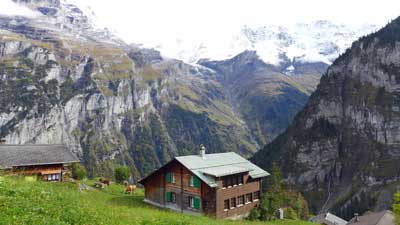
Zurich and Geneva are pleasant but dull. The good news is that Switzerland is packed with amazing sights and none of them are the big cities. If you aren’t 100% locked in yet, please read the article below and I think you’ll enjoy it.
Is the Swiss Travel Pass a good deal? Here's the short version

The bottom line is that the scenery, train journeys, and cable car rides in Switzerland are stunning and not found anywhere else in the world. They are also quite expensive if you pay for them one at a time. So no matter how you visit Switzerland, you are going to be paying quite a bit, or skipping the absolute best things that you’ve come there to see.
With good planning it’s quite easy to get great value out of a Swiss Travel Pass, but it might be a poor choice for those who don’t like to plan ahead. You can easily do a scenic train ride and a cable car in the same day, and still have time to do a scenic hike in the process.
First class or second class? Good news for most people
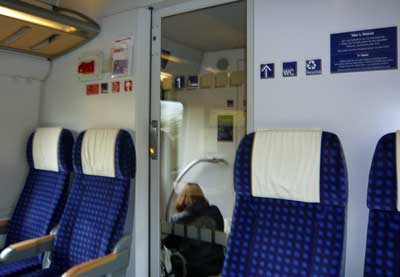
That said, Swiss Trains are literally the nicest in Europe and even the Second Class seats and carriages are nicer and roomier than trains in neighboring countries. The First Class seats are larger and nicer with only 3 across the cabin instead of 4, but honestly Second Class is perfectly comfortable for almost everyone.
Again, First Class on European trains like this is generally popular with business travelers where the company is paying and they need to get work done during the ride, and also senior citizens who don’t want to worry about a carriage full of backpackers. For most of the rest of us, Second Class is more than comfortable enough and the seat width and legroom compare to business-class airline seats. I’m a big and tall guy and I almost always travel in Second because it’s plenty comfortable enough and all the seats arrive at the same time anyway.
The longer you'll be in Switzerland, the better deal a Swiss Travel Pass will be
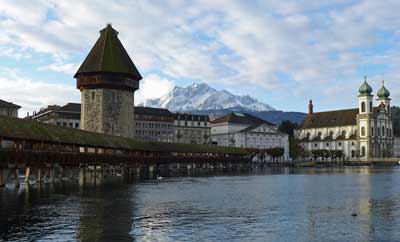
In other words, if you are staying 5 days or fewer, you have to do the math to determine your best option. But if you are spending even 6 or 7 days in Switzerland then the 6-day or 8-day Pass is almost guaranteed to be a great deal and your best choice. Once you have a Swiss Travel Pass you’ll absolutely love the ability to just hop on any train (excellent trains, always on time) and most boats and cable cars without having to worry about the cost. The per-day cost of an 8-day Pass even if you only use 6 of those days is about CHF65, and Switzerland is filled with amazing train rides and boats and cable cars that can get you that much value before noon each day.
Schilthorn (50% discount) and Jungfraujoch (25% discount) are cheaper with a Swiss Travel Pass
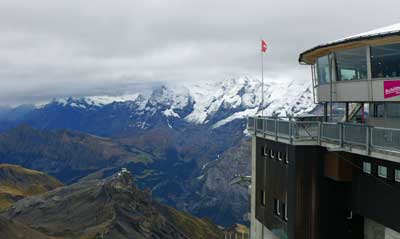
Both of those peak experiences are extraordinary and different from each other. Even so, compared to Jungfraujoch, Schilthorn is also faster and more comfortable on the way up and down. You can enjoy an excellent visit to Schilthorn in 4 hours or so (or a bit longer if you eat at the spinning Piz Gloria restaurant at the top), while a visit to Jungfraujoch requires closer to 6 hours.
NOTE: Schilthorn closes for maintenance for a week or two in late November most years.
Consider the Swiss Half-Fare Card instead
If you AREN’T going to be doing two or more of the long (and expensive) scenic train trips, you will get much better value out of the Swiss Half-Fare Card, which is explained a bit below.
Mt Rigi, near Lucerne, is 100% covered by the Swiss Travel Pass
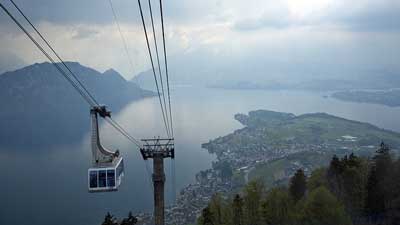
Is a Swiss Travel Pass right for you?
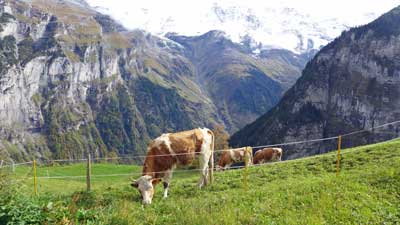
Most people only visit Switzerland for 5 or 6 days at most, so the 3-day and 4-day passes are the ones to focus on. But if you are staying for 8 days or more, those longer passes are almost certainly a great deal for you.
Long story short, if you plan on doing 2 of the more expensive scenic trains and the Jungfraujoch railway or the Schilthorn cable car, then the pass will save you money. Switzerland is expensive, but it’s worth it, and the travel pass can help make it a bit more affordable.
What the Swiss Travel Pass includes
- Free rail travel on normal trains and most scenic trains
- Discounted travel (about 50%) on popular tourist mountain trains
- Discounted travel (about 50%) on popular tourist cable cars
- Free travel on public transport in 75 towns and cities
- Free entry to around 500 museums in Switzerland
The Swiss Travel Pass covers the fare on the most popular scenic and panoramic trains. You can choose a normal seat in a regular carriage for no additional cost, but there is a supplement of CHF8 to CHF49 for a reserved seat in one of the special panorama carriages on these routes.
Prices of the 2024 Swiss Travel Pass
1st Class
- Adult 3-day Pass: CHF389
- Youth (4 to 25) 3-day Pass: 274
- Adult 4-day Pass: 469
- Youth (4 to 25) 4-day Pass: 330
- Adult 6-day Pass: 602
- Youth (4 to 25) 6-day Pass: 424
- Adult 8-day Pass: 655
- Youth (4 to 25) 8-day Pass: 469
- Adult 15-day Pass: 723
- Youth (4 to 25) 15-day Pass: 512
2nd Class
- Adult 3-day Pass: CHF244
- Youth (4 to 25) 3-day Pass: 172
- Adult 4-day Pass: 295
- Youth (16 to 25) 4-day Pass: 209
- Adult 6-day Pass: 379
- Youth (16 to 25) 6-day Pass: 268
- Adult 8-day Pass: 419
- Youth (16 to 25) 8-day Pass: 297
- Adult 15-day Pass: 459
- Youth (16 to 25) 15-day Pass: 328
Swiss Travel Pass Flex
This version costs a bit more, but you don’t have to use the travel days consecutively. It’s a great option for anyone who won’t be taking longer train rides each day.
- Adult 3 Flex days in 1 month (1st Class): CHF445
- Adult 3 Flex days in 1 month (2nd Class): 279
- Adult 4 Flex days in 1 month (1st Class): 539
- Adult 4 Flex days in 1 month (2nd Class): 339
- Adult 6 Flex days in 1 month (1st Class): 644
- Adult 6 Flex days in 1 month (2nd Class): 405
- Adult 8 Flex days in 1 month (1st Class): 697
- Adult 8 Flex days in 1 month (2nd Class): 439
- Adult 15 Flex days in 1 month (1st Class): 755
- Adult 15 Flex days in 1 month (2nd Class): 472
Where to buy the Swiss Travel Pass
The Swiss Half-Fare Card – A better option for many visitors
Far less confusing than the Swiss Travel Pass, you can instead get a Swiss Half-Fare Card, and it will be a better deal for many travelers. The price is lower and it’s much easier to do the math, and the discounts are greater on some things as well.
- Swiss Half-Fare Card for 30 days: Adults – CHF120 or US$129
What you get:
Those who buy the Swiss Half-Fare Card will get 50% discount on all trains, buses, and boats in Switzerland for up to 30 days, as well as 50% off all public transportation in 75 cities and towns.
>>>Buy the Swiss Half-Fare Card
Why the Half-Fare Card is a better deal for many
While the Swiss Travel Pass is a great deal for those doing many of the expensive scenic journeys and mountain sights within a few days, it’s not good value for those who are doing fewer of the expensive trips and/or those who are staying longer. Also, the Swiss Travel Pass only provides a 25% discount on the amazing Jungfraujoch Railway, which costs between CHF120 and CHF224 return depending on your starting point, while the Half-Fare Card provides a 50% discount.
The math is simple as well. You can just add up the cost of the trains, boats, and buses you’ll be taking while in Switzerland, and if the total is more than CHF240 or so, the Half-Fare Card will save you money.
Example itinerary:
- Zurich to Interlaken train (2nd Class): CHF50
- Schilthorn Cable Car: CHF112
- Jungfraujoch railway from Interlaken: CHF205
- Interlaken to Lucerne train (2nd Class): CHF33
- Mt Rigi roundtrip from Lucerne: CHF84
- Engelberg (near Lucerne) to Mt. Titlis Cable Car: CHF92
- Lucerne to Zurich train (2nd Class): CHF25
Total per person: CHF601
Total with Half-Fare Card (including price of card): CHF420.50
It would be tough to do all of those things in 4 days, although it is possible. If you bought a 4-day Swiss Travel Pass here is how it adds up:
4-Day Swiss Travel Pass: CHF259
Supplements for Schilthorn, Jungfraujoch, and Mt. Titlis: CHF203.25
Total cost: CHF462.25
Bottom line on the Swiss Half-Fare Card
Since the Half-Fare Card lasts 30 days and provides a larger discount on Jungfraujoch, it is better value for visitors who want to include that scenic top-of-Europe rail journey on their trip. The discounts also add up more quickly on Schilthorn and Mt. Titlis trips, just to name two examples, and you don’t have to take many longer rail journeys to get value out of the Half-Fare Card.
Swiss Saver Day Pass (A one-day unlimited travel pass)
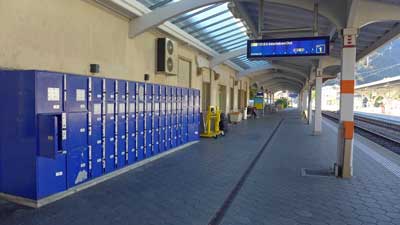
If you buy the Saver Day Pass at least 21 days in advance (and up to 60 days in advance) the 2023 cost is:
- 2nd Class (with Half Fare Card): CHF29
- 1st Class (with Half Fare Card): CHF82
- 2nd Class (with no Half Fare Card): CHF52
- 1st Class (with no Half Fare Card): CHF97
Once you research the normal cost of Swiss train fares you’ll see that the above prices are a very good deal for anyone riding more than 150 kilometers or so in a day. If you are just going, for example, from Zurich to Lucerne or Interlaken on a day, it’ll be cheaper to just buy that ticket individually. But if you are going from Geneva or Montreux to Interlaken or Lucerne then the Saver Day Pass will be much cheaper. Better still, you can use a Saver Day Pass to go from Interlaken to Geneva and back on the same day on the Goldenpass line and returning on the faster train through Bern, and it will still all be included for free.
If you don’t buy a Saver Day Pass at least 14 days in advance it’s more expensive, and if you only buy 1 to 3 days in advance it’s VERY expensive, so the key is to buy early. This is all confusing, but the Saver Day Pass should be a great option for many people only in Switzerland for one to three days.
Popular Swiss panorama scenic trains
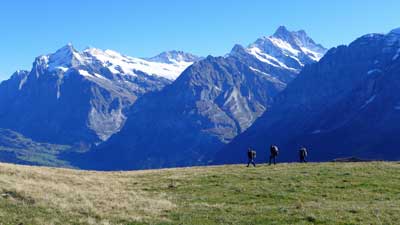
- Glacier Express
- Route: Zermatt to St. Moritz
- Train type: Panorama
- Journey time: 8 hours 3 minutes
- Distance: 291km
- 1st Class fare: CHF272
- 2nd Class fare: CHF159
- Compulsory seat reservation fee: CHF44 or 49
- Supplement for Swiss Pass holders: 13 to 33 for panorama carriage
- Bernina Express
- Route: Chur to Tirano and Lugano
- Train type: Panorama and bus
- Journey time: 4 hours 13 minutes and 3 hours 10 minutes
- Distance: 148km and 90km
- 1st Class fare: CHF113
- 2nd Class fare: CHF66
- Compulsory seat reservation fee: CHF32
- Supplement for Swiss Pass holders: 10 to 14 for panorama carriage
- GoldenPass Line
- Route: Lucerne to Montreaux
- Train type: Panorama
- Journey time: 5 hours 8 minutes
- Distance: 191 km
- Prestige Class fare: CHF131
- 1st Class fare: CHF96
- 2nd Class fare: CHF56
- Supplement for Swiss Pass holders: 8 to 15 for panorama carriage
- Gotthard Panorama Express (formerly Wilhelm Tell Express)
- Route: Lugano or Locarno to Lucerne
- Train type: Panorama and boat
- Journey time: 5 hours 21 minutes
- Distance: 182 km
- 1st Class fare: CHF164
- 2nd Class fare: CHF135
- Supplement for Swiss Pass holders: 39 to 49 for panorama carriage
- Swiss Chocolate Train
- Route: Montreux to Broc round trip
- Train type: Panorama or First Class
- Journey time: X hours X minutes
- Distance: 82 km
- 1st Class fare: CHF99
- 2nd Class fare: 89
- Supplement for Swiss Pass holders: 39
Popular Swiss scenic and theme trains
The scenic trains below are also extremely popular as sightseeing journeys rather than just as transportation, but can be used as both.
- Jungfraujoch round trip
- Route: Interlaken to Jungfraujoch
- Train type: special mountain train
- Journey time: 4 hours 41 minutes, round trip, plus time on top
- Distance: 73 km
- 1st Class fare: N/A
- 2nd Class fare: CHF224
- Supplement for Swiss Pass holders: 147 (so, a saving of CHF77)
- Gornergrat Railway
- Route: Gornergrat Railway
- Train type: Cog railway
- Journey time: 44 minutes return
- Distance: 10 km
- 1st Class fare: N/A
- 2nd Class fare: CHF90
- Supplement for Swiss Pass holders: 45
- Rigi round trip
- Route: Lucerne to Rigi
- Train type: Cog railway
- Journey time: 3 hours 25 minutes, plus time at the top
- Distance: 58 km
- 2nd Class fare: CHF78
- Supplement for Swiss Pass holders: None (this one is free with the pass)
- Mt Rigi Excursion (one-way and walk down)
- Route: Lucerne to Mt Rigi
- Train type: cogwheel train and/or cable car
- Journey time: 45 minutes up
- 1st Class fare: N/A
- 2nd Class fare: 49
- Supplement for Swiss Pass holders: 0
- Lotschberg Mountain Route and Centrovalli
- Route: Bern to Locarno
- Train type: Narrow gauge
- Journey time: 4 hours 40 minutes
- Distance: 212 km
- 1st Class fare: CHF158
- 2nd Class fare: CHF90
- Supplement for Swiss Pass holders: 5
- Jura round trip (Watchmaking Tour)
- Route: Neuchatel through Jura
- Train type: Regular
- Journey time: 3 hours 0 minutes
- Distance: 143 km
- 1st Class fare: CHF168
- 2nd Class fare: CHF108
- Supplement for Swiss Pass holders: 0
- Pre-Alpine Express
- Route: St. Gallen to Lucerne
- Train type: Regular
- Journey time: 2 hours 15 minutes
- Distance: 146 km
- 1st Class fare: CHF83
- 2nd Class fare: CHF47
- Supplement for Swiss Pass holders: 0
- Jura Foot Line
- Route: Basel to Geneva
- Train type: Regular
- Journey time: 2 hours 40 minutes
- Distance: 248 km
- 1st Class fare: CHF132
- 2nd Class fare: CHF75
- Supplement for Swiss Pass holders: 0
Popular Switzerland cable car rides
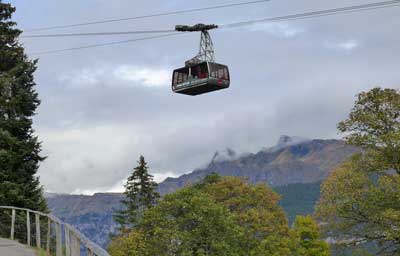
- Schilthorn
- Route: Stechelberg (Lauterbrunnen) to Schilthorn
- Train type: cable car
- Journey time: 1 hour
- 2nd Class fare: CHF108
- Supplement for Swiss Pass holders: 54
- Engelberg to Mt. Titlis cable car
- Route: Engelberg to Mt. Titlis
- Train type: cable car
- 2nd Class fare: CHF96
- Supplement for Swiss Pass holders: 46
The Swiss Travel Pass also includes free museum admission, but…
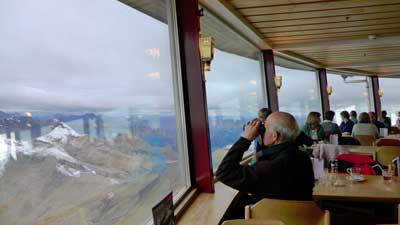
The problem is that the museums are only free on valid travel days, and almost no one would visit more than one or two museums with a Swiss Travel Pass. The trains and cable cars are so expensive that the pass gives very good value to cover those, so you don’t want to waste precious sightseeing time walking through a museum that only costs CHF10 anyway.
In other words, calculate the value of a Swiss Travel Pass on the travel savings only, and if you visit a museum here or there, then great. Most people are better off trying to squeeze in an additional train ride each day, and ignoring the museums. Switzerland is all about the outdoor scenery. As nice as the museums may be, they are not why you are there.
The pass includes free public transport in most Swiss cities
Similar to the free museum part of the offer, it’s best to ignore or minimize the value of free public transportation. It could be helpful in Zurich, but in most other Swiss tourist towns you won’t need much public transport. In fact, in Interlaken, each hotel or hostel guest automatically gets a card for free public transportation within the town (including between the two train stations).
So you might use a ride or two each day on public transport, but that won’t add up to much in terms of value of your Swiss Travel Pass.

Hi Roger,
thanks for the reply.We are almost done planning and was reading through your recommendations.On Monday we are doing Schilthorn (we are staying in Interlaken)
We have to get back to Lucern that evening.I was wondering whether we will have some time to visit Gimmelwald on our way down Schilthorn?We looked for hotels in Gimmerwald for Sunday night ,but most of them need two days booking.Is cable car the only option to get to Gimmelwald and Murren from Lauterbrunnen ?
We have settled on Swisspass now.So we have to pay for all the cable cars, right?
Thanks again
Omana
Omana,
On the way back down from Schilthorn you can get off the cable car at Murren and walk about 15 minutes downhill to Gimmelwald, or just get off in Gimmelwald and walk around for 30 minutes until the next cable car. The cable car is the only way other than walking to get between Gimmelwald and Lauterbrunnen.
With the Swiss Travel Pass you get a 50% discount on some cable cars, and others are free. I believe the cable cars between Murren and Lauterbrunnen are free, but the one from Murren to Schilthorn is a 50% discount. -Roger
Hi Roger,
My husband and I are planning a trip to Switzerland reaching on August 11 and saw your highly informative blog.Thank you so much for taking your precious time to help the confused people like me.
Reaching Interlaken on 11th night from Zurich by train
Aug 12: Jungfraujoch and would like to do some hikes.
Aug 13:Golden pass scenic train ride
Aug 14:Schilthorn and train to Lucern
Aug 15:Lake lucern boat ride and train to Zurich
Aug 16:Rhine waterfall tour and flying out to Berlin at 4:25 pm
Do you think the half fare card is better for us?
Thank you so much
Omana
Omana,
I’m happy to help. Your plan looks quite good and you should have plenty of time to do everything on your list plus a few extra things here and there. If you are going all the way to Montreux and back on the Goldenpass train, the Swiss Travel Pass might pay for itself, but I’m not even sure about that. I’d say the Half Fare Card will definitely save you a LOT more than the price of the thing, and the Swiss Travel Pass could potentially be even better. I guess the problem is that a 4-day pass wouldn’t cover all of your journeys, and an 8-day pass costs an extra CHF117 each to cover that last day. It shouldn’t take you too long to check the fares on those train rides on sbb.com and see what they add up to. Best of luck with this. -Roger
I am planning a Switzerland trip for 2 days
Day 1: Reaching around 10 am to Lucern station from germany.
Planning to go Titlis + anything we can cover in that day ( any suggestion )
Stay at Lucern
Day 2 : Using Golden Pass to Interlaken
Boat trip in between. ( Anything else we should cover in same day )
Leave late night to germany
Suggest which travel pass should I take ?
Adi,
If you’ve got a few spare hours in Lucerne during the day I’d recommend the 2-hour lake cruise that leaves from the dock in front of the train station. It’s basically a hop-on, hop-off boat that stops at 6 or 7 small towns around the edges of the lake and then returns to the dock. You get some really wonderful views of the lake on that trip, and you can hop off in one of the small towns if you like, and then hop on the next boat, which is usually 30 minutes later.
I’d say if you have a few hours in Interlaken I’d recommend taking the train/bus/cable car trip to Murren, which is described in detail in my article on where to go in Switzerland. From Interlaken Ost (east) train station you can be in Murren in about an hour. Then you can walk around that car-free village for a bit and then walk down the train to Gimmelwald. Then take the cable car back down and head back to Interlaken. As long as the weather is fairly clear up there, it’ll be a wonderful little trip, and it won’t cost much.
The Half Fare Card should save you the most money if you stick to this plan. Everything on your list will cost half of the regular price, including your train trips from and back to the German border. However, it might end up being cheaper to get a supersaver-type ticket all the way from and back to Germany, and on those you can’t use the Half Fare Card. Have a great trip. -Roger
Hi Roger,
I know you’ve been answering tons of these questions already. But to be honest, I would still need your suggestions if you can give me few mins on this.
I am travelling with my mother during October. So here is the first question. Is it a good or bad choice to travel during that period ? (Traveling date: 27th – 31st October 2017)
The plans are:
27th Oct Zurich – Lucern *We are planning to book the hotel at Lucern only and travel around from there.
27th Oct Zurich airport to Lucern + Lucern to Bern and then back to Lucern
28th Oct – Mount Pilatus
29th Oct – Mount Titlis (And if we have enough time, we might travel to see Rhine falls)
30th Oct – Jungfrau and Lutherbrunen and back to Lucern
31st Oct – Lucern – Zurich airport
*We might just cut off 1 mountain and go for a nice train view etc.
Well, plans might change according to the weather, but thats the first plan. So what kind of pass would you recommend ? And my mother is 68 years old. Any discount for seniors ?
Really looking forward to your suggestion mate. Thank you so much in advance.
John,
As I’ve mentioned in a few spots before, some mountain hotels and restaurants in Switzerland are closed between mid October and mid December, but that’s mostly because they don’t get nearly as many guests as they do during the summer hiking months and the winter snow months. Still, there are plenty of places open and you’ll probably enjoy the peacefulness. The weather is actually still pretty good then as well. The rainy months are in summer, weirdly enough, so October is pretty nice. You can get fog or rainstorms at the mountain peaks any time of year, so it’s always a little bit of a gamble.
That day of starting in Lucerne and going up to Jungfraujoch and back to Lucerne again is going to be a long day, but the trains run from like 5am until midnight every day so it can definitely be done. Also, I’m one of many people who thinks that the Interlaken area is more scenic and charming than the Lucerne area, although they are both nice. If you can stay in the Interlaken area for one or two of those nights I’m sure you’d enjoy it. However, with your mother I can see why changing hotels could be complicated.
Switzerland doesn’t have any senior discounts for transportation, but of course they do have the Half Fare Card, which is good value for almost any adult who will be there for more than a day or two. Let me know if you have any other questions. -Roger
Hi Roger,
Thanks for writing such a detailed Swiss Travel Pass blog. It’s really thorough and very helpful. It’s almost like the perfect Swiss travel blog.. (covers most popular routes) 😀 . I have a couple of questions regarding the Swiss Travel Pass. My fiancee and I are planning a 21-day trip to Switzerland. My scratchpad looks as follows (it’s not by any means fixed yet, so we’re probably going to fine tune a little bit here and there) :
2 Aug 17
Arrive in Zurich. Stay 5 days/nights for city sightseeing, in and around Zurich. Might take day trips to Basel.
7 Aug 17
Take train to Chur. Continue, Chur –> St. Moritz on Glacier Express Train
Stay in St Moritz for 2 nights
9 Aug 17
St. Moritz –> Zermatt on Glacier Express
Stay 1 night in Zermatt
10 Aug 17
Zermatt to Interlaken (initially planning to stay in Lauterbrunnen, but I’m following your previous advice to another user to stay in Interlaken instead of Lauterbrunnen, for the more abundant choice of food, activities, etc)
Staying in the area for 3-4 nights
14 Aug 17
Take train from Interlaken to Montreux.
Stay in Montreux for 4 nights
18 Aug 17
Montreux to Geneva.
Stay in Geneva for 3 nights
21 Aug 17
Geneva to Zurich. Going to the airport. Depart Zurich, Switzerland
I’m planning to do the scenic Jungfraujoch train ride and Schilthorn cable car trip between 10-14 Aug 17. I’d like to hear your thoughts on that.. and
I’m probably getting either the 8-day Travel Pass Flex (non-consecutive days) or the Half-fare pass. Doing the simple math, I believe I’d save more money with the Half-fare card. What do you think?
Any advice on where I should go dine, lounge, sightsee along those routes would be very much appreciated :DD
Regards
Stanley
Stanley,
Thank you for the kind words. The Half Fare Card would definitely save you quite a bit, but that 8-day flex pass might save even more if you do those train rides. It sounds like you’ve done the math, and you probably have it right.
Really my main comment is that it’s quite unorthodox to spend that might time in Switzerland and focus that much on the cities. In case you haven’t read my main article on where to go in Switzerland, you should at least give it a scan. Switzerland is an amazing and rich country with so much to see. However it’s somewhat strange that the big cities are fairly boring by European standards. Zurich is ridiculously expensive and it’s nice for a day or two, but really there isn’t much to see. If you compare it to Paris or Salzburg or Prague or Budapest or Vienna, it really doesn’t measure up. The majority of visitors to Zurich are business people on expense accounts, and it feels that way when you are there. Basel is also fairly dull except when the art fair is going on. Geneva, Lausanne, and Montreux all have lovely settings on Lake Geneva, but the towns themselves aren’t very special. If you have specific things you want to see in each of these places then by all means go and see them. The reason I mention this is that my own normal strategy for visiting a new country is to spend time in the largest city and if I have time I also spend time in the second largest city. In most of Europe that works like a charm, but in Switzerland it’s less than ideal.
Really the reason to go to Switzerland is to see the amazing scenery. Fortunately, hotels and restaurants in the touristy towns like Interlaken and Lucerne are at least a bit cheaper than in the cities. I’m happy to answer more questions if you have them. -Roger
Hello Roger,
It is sooo much informative. Was searching a lot about good information related to Swiss pass and got it here only. Can you please help me in choosing right places to visit in Switzerland? I will be there in end of Sept. Here is my tentative plan.
Day 1:zurich, rihne waterfall and Zurich city tour
Day 2:zurich to Mt. Titlis and back to Zurich
Day 3:zurich to Bern (whether to visit Mt rigi and proceed to Bern in evening?)
Day 4:hiking in thun (don’t know where to search for information) and back to Bern.
Day 5:hiking in Bern and proceed to wangen
Day 6:wangen to jungfrauch Nd back to wangen
Day 7: Wengen to Trummelbach Falls and proceed to Interlaken
Day 8:interlaken city tour and proceed to Zurich late for next day flight to India.
Can you please help me to know whether this plan is feasible? And should I book Swiss half price pass? And if I want to add any Swiss scenic train in above plan, then where can I do that?
Waiting for your reply
Regards
Archana
Archana,
I’m happy to help. Your plan should work, however I feel compelled to make a couple of suggestions. First off, Zurich is a nice city, but it’s pretty boring by European standards and it’s ridiculously expensive, especially for hotels. You can pay US$250 per night for a small hotel room in Zurich and the bathroom will still be down the corridor. In almost any other Swiss city you can get a room that is twice as large with en-suite for closer to US$200. You might have a look at my main article on where to go in Switzerland, which discusses staying in the Interlaken area as well as Lucerne.
Bern is the nicest and most photogenic of the Swiss cities, but still I’d recommend staying elsewhere if you are planning on hiking those days. You get a lot more for your money outside of the cities, and the mountain towns such as Gimmelwald, Murren, and Wengen are also far more charming and memorable.
I do think the Half Fare Card will be your best bet. A full Swiss Travel Pass would cost quite a bit to cover all 8 days, while the Half Fare Card is only CHF120 for a 30-day pass.
As far as scenic rail trips, my advice is to plan on visiting different places in Switzerland that interest you and enjoy the amazingly scenic train rides along the way. Pretty much every train ride in Switzerland is scenic, except for those right around Zurich. One of the problems with those scenic train rides is that many of the best ones take 4 to 6 hours each way. That means either staying overnight and then doing the same route coming back, or going back the same day and spending all that time on trains. All of the rides between the places on your list are wonderful, so I don’t know if it’s worth it to add an extra one.
Also, you probably don’t want to stay in Zurich on your final nights. There is a train station at the Zurich Airport that is on the main line, so you don’t necessarily have to go to Zurich to get that train. And there are hotels close to the airport that are a bit cheaper than those in the city center. The trains start at around 5:00 every morning and are famously punctual, so unless you have a very early flight you can get to the airport from almost anywhere in Switzerland if you leave early enough. Let me know if you have any other questions. -Roger
Hi,
Thanks for all the replies Roger. I understand that the half fare card can be purchased within Switzerland. Can I book tickets in advance on the Swiss Railways site and receive the half-fare price?
In case of advance booking, where or which website can I buy the HFC and train tickets?
Prachi
Prachi,
You can buy the Half Fare Card in Switzerland, but you can also buy it online. There is a link in the article above that takes you to where you can buy it on RailEurope.com or RailEurope-world.com. Rail Europe is a company co-owned by the France and Swiss rail companies and the “world” version is for anyone outside the US and Canada. You can get the Half Fare Card as a digital download as well, so you pay no shipping.
However, you can buy half-fare train tickets before you buy the HFC. Just go onto the official Swiss rail website and when it asks you what “Reduction” you will be using you can just drag the little slider down to Half Fare Travelcard. It will show you the half price and you can buy it that way. The only catch is that when you go to USE a half-fare ticket the ticket taker will also ask to see your valid Half Fare Card. Let me know if you have any other questions. -Roger
Could you please advise which travel pass is best? Two adults and a 26 year old. I also need some ideas for excursions as well.
Day 1: Zurich-Lucerne
Day 2: Lucerne-Interlaken (Lucerne/Interlaken Express)- no plans this day?? any ideas (Schilthorn- or will it be too late in the day)
Day 3: Day trip to Zermatt-back to Interlaken
Day 4: Day trip Murren-Grimmelwald?
Day 5: Interlaken-Montreux – which Panoramic train? (Castle Chillon)
Day 6: Day trip from Montreux to Gruyeres
Day 7: Lenzburg- what to do?
Day 8: Lenzburg- visit friends in Teufenthal
Day 9: Lenzburg- day trip to Zurich?
Day 10-12: Zurich or Lucerne- want to go to St. Gallen Abbey
question: Eurail Pass or Swiss Travel Pass?
question: can you help fill in the blanks for day trip ideas
Thanks!
Ann,
Switzerland is different from most other popular European countries in that it doesn’t offer a single-country Eurail Pass, but it does offer the special Swiss Travel Pass that is described in the article above. So really your options are a Swiss Travel Pass, a Half Fare Card, or just buy tickets individually. In your case the Half Fare Card would be FAR cheaper than buying individually, so it’s just the Half Fare Card or the Swiss Travel Pass.
As I mention in my review above, the full pass is good value for those who are taking at least 2 or 3 of the longer scenic rail trips. That would also include Interlaken to Zermatt and back on the same day. So it looks like you are taking at least 2 or 3 of them, which would be sort of borderline. In other words, if you decide to do more rail travel on some of those open days then a Swiss Travel Pass will pay for itself pretty easily. But if you decide NOT to take more longer train rides on those days then a Half Fare Card will likely save you more.
In the coming days I’m going to be adding a few more things to my main article on where to go in Switzerland, but aside from that I really don’t like to fill in people’s itineraries for them. There are hundreds of great hikes and things to see and do in Switzerland, and they are listed in any guidebook as well as ricksteves.com, lonelyplanet.com, and wikitravel.org, just to name a few. Have a great trip. -Roger
Hi Roger,
Here is my sight seeing plan in Switzerland please suggest me which pass or individual ticket is best.
Day 1: Reach Zurich hb at 2:30 PM. Check in hotel which is in Rumlang. Goto to Rhine falls and if possible then Zurich city visit and come back to hotel.
Day 2: From Zurich to Lucerne. Check in hotel which is in Meghan. Visit My. Rigi and come back to hotel.
Day 3: From same hotel visit Mt. titlis
Day 4: Lucern hotel to Interlaken. Check in the hotel. Visit Mt. jaungfrau.
This is what I planned roughly. Please suggest me on the if I can cover any other destination within these days and which train ticket will be cost effective.
Thanks in advance
Regards,
Dipankar
Dipankar,
The key factor for determining whether a Swiss Travel Card will be a big money saver is whether you are planning multiple longer train trips. Since it seems that you are mostly doing shorter train trips as well as mountaintop attractions that are only eligible for a discount with a Travel Pass, the Half Fare Card should be better value for you. Again, the Half Fare Card provides a 50% discount on Jungfraujoch compared to only 25% discount with the Swiss Travel Pass. That tourist train almost pays for the Half Fare Card by itself, and saves about CHF55 (US$55) compared to the pass. It looks like a great trip. Bon voyage. -Roger
Thanks for the reply Roger!
Other than Switzerland we will also be traveling to Munich, Germany and Salzburg, Austria. It would be very helpful if you could answer a few questions about travel in these countries –
We will be traveling from Munich to Salzburg and then from Innsbruck (Austria) to Zurich. Also, we will be traveling around Munich. Do you think we should buy the Eurail pass? Or just buy individual / point-to-point train tickets? Also, should we rent a car for travel within Austria and Germany or use public transport?
Thanks,
Prachi
Prachi,
Eurail Passes are really only best for people who are traveling for 3 or more weeks AND who want to make plans as they go. For these relatively short rides you are planning, if you buy the train tickets online at least a month or so in advance, they will be fairly cheap. And I wouldn’t rent a car to visit cities like this. Parking is always a problem and it can be confusing driving around these areas at first. Also, the view from the train is almost always much better than views from the autobahns, and it’s just much more pleasant and stress-free.
You didn’t ask, but I feel compelled to mention that Innsbruck is famous for being a ski resort and for holding the Olympics. Aside from those things there isn’t much to see there. If you want to go skiing it’s a great place to do it, but if you want to see towns in the mountains and interesting sights, I’d skip it and spend more time around Salzburg. Have a great trip. -Roger